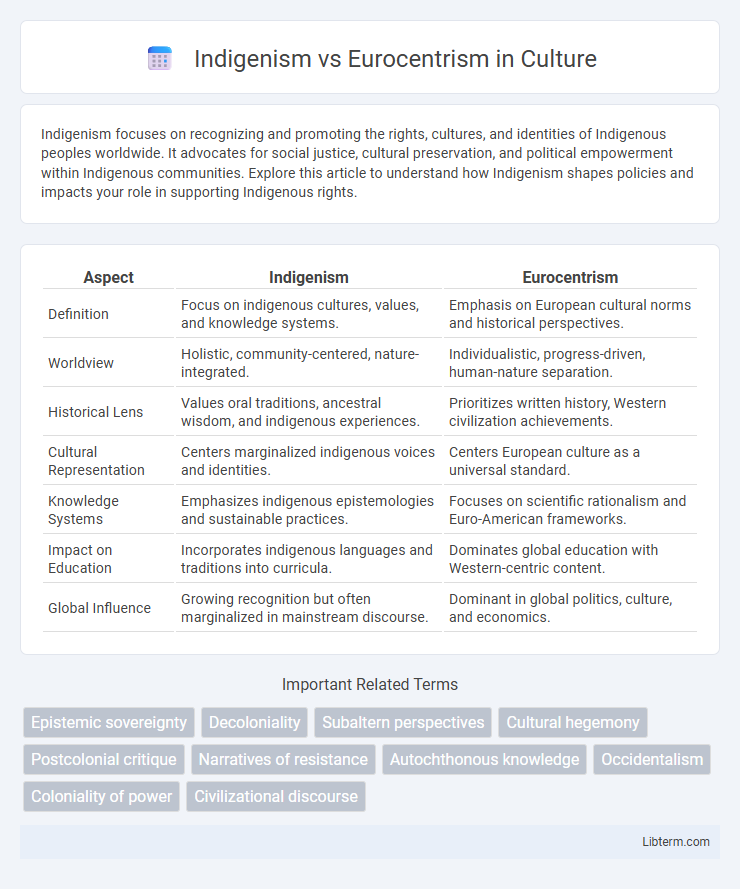Indigenism focuses on recognizing and promoting the rights, cultures, and identities of Indigenous peoples worldwide. It advocates for social justice, cultural preservation, and political empowerment within Indigenous communities. Explore this article to understand how Indigenism shapes policies and impacts your role in supporting Indigenous rights.
Table of Comparison
| Aspect | Indigenism | Eurocentrism |
|---|---|---|
| Definition | Focus on indigenous cultures, values, and knowledge systems. | Emphasis on European cultural norms and historical perspectives. |
| Worldview | Holistic, community-centered, nature-integrated. | Individualistic, progress-driven, human-nature separation. |
| Historical Lens | Values oral traditions, ancestral wisdom, and indigenous experiences. | Prioritizes written history, Western civilization achievements. |
| Cultural Representation | Centers marginalized indigenous voices and identities. | Centers European culture as a universal standard. |
| Knowledge Systems | Emphasizes indigenous epistemologies and sustainable practices. | Focuses on scientific rationalism and Euro-American frameworks. |
| Impact on Education | Incorporates indigenous languages and traditions into curricula. | Dominates global education with Western-centric content. |
| Global Influence | Growing recognition but often marginalized in mainstream discourse. | Dominant in global politics, culture, and economics. |
Defining Indigenism and Eurocentrism
Indigenism centers on valuing Indigenous perspectives, knowledge systems, and cultural sovereignty, emphasizing the importance of ancestral ties and self-determination in framing history and social policies. Eurocentrism prioritizes European cultural norms and historical narratives, often marginalizing non-European voices and imposing Western-centric frameworks on global understanding. The contrast lies in Indigenism's challenge to dominant Eurocentric paradigms by advocating for the decolonization of knowledge and recognition of Indigenous epistemologies.
Historical Roots of Indigenist and Eurocentric Perspectives
Indigenism traces its historical roots to the advocacy and revival movements championed by Indigenous peoples resisting colonization and asserting their cultural identity, land rights, and sovereignty. Eurocentrism stems from the intellectual and political dominance established during the Renaissance and Enlightenment, which centered European experiences as universal standards, often marginalizing non-European histories and worldviews. These divergent foundations reflect contrasting epistemologies: Indigenism emphasizes ancestral knowledge and lived experiences, while Eurocentrism prioritizes Western rationalism and historical narratives.
Colonial Legacies: Power Dynamics and Knowledge Production
Colonial legacies have deeply influenced power dynamics, privileging Eurocentrism in knowledge production by centering Western epistemologies while marginalizing Indigenous worldviews. This dominance shapes global narratives, reinforcing structures that validate colonial histories and suppress alternative Indigenous knowledge systems. Challenging these hegemonies requires decolonial approaches that elevate Indigenous epistemologies as equally valid frameworks for understanding history, culture, and society.
The Role of Language in Shaping Worldviews
Language serves as a powerful tool in shaping worldviews, with Indigenism emphasizing indigenous languages as a means to preserve cultural identity and cosmology. Eurocentrism often prioritizes Western languages, projecting a singular worldview that can marginalize non-European epistemologies. The inherent structures and vocabularies in each linguistic tradition frame distinct perceptions of reality, underscoring how language influences the interpretation of history, nature, and social organization.
Cultural Narratives: Myths, Values, and World Outlooks
Indigenism emphasizes cultural narratives rooted in ancestral myths, communal values, and holistic worldviews that foster deep connections to land and spirituality. Eurocentrism prioritizes individualism, rationalism, and linear historical perspectives shaped by Greco-Roman traditions and Enlightenment ideals. These contrasting world outlooks influence how knowledge, identity, and social organization are constructed and validated across societies.
Impact on Education Systems and Curricula
Indigenism challenges Eurocentrism by promoting the inclusion of Indigenous knowledge, languages, and worldviews in education systems, which transforms curricula to reflect diverse cultural perspectives often marginalized in traditional Eurocentric frameworks. This shift encourages critical thinking and fosters cultural identity among Indigenous students while broadening the understanding of all learners by integrating holistic, place-based pedagogy and decolonized content. Educational institutions adopting Indigenist approaches report improved student engagement, retention, and academic achievement, demonstrating the concrete benefits of decolonizing curricula previously dominated by European historical narratives and epistemologies.
Representation and Voice in Media and Literature
Indigenism challenges Eurocentrism by prioritizing authentic representation and amplifying Indigenous voices in media and literature, fostering cultural self-determination and narrative sovereignty. Eurocentric frameworks often marginalize Indigenous perspectives, perpetuating stereotypes and silencing diverse worldviews. Emphasizing Indigenous authorship and media production transforms dominant narratives, promoting equity and cultural revitalization across global platforms.
Environmental Understanding: Traditional vs Western Approaches
Indigenism emphasizes a holistic environmental understanding rooted in ancestral knowledge, viewing humans as integral to nature with sustainable resource management practices. Eurocentrism typically adopts a mechanistic and utilitarian perspective, prioritizing economic growth and scientific control over ecosystems. These contrasting approaches shape diverse strategies in addressing environmental challenges and biodiversity conservation.
Pathways to Decolonization and Reconciliation
Pathways to decolonization and reconciliation emphasize Indigenous knowledge systems and cultural revitalization as foundational strategies to challenge Eurocentric narratives. Implementing Indigenous-led education reform and legal reforms, such as land rights recognition and treaty acknowledgments, promotes restorative justice and cultural sovereignty. Collaborative frameworks between Indigenous communities and governments foster mutual respect and the dismantling of colonial power structures essential for meaningful reconciliation.
Towards Epistemic Pluralism: Harmonizing Diverse Perspectives
Indigenism challenges Eurocentrism by advocating for the recognition and validation of indigenous knowledge systems alongside Western epistemologies, promoting epistemic pluralism. Harmonizing diverse perspectives enhances understanding through inclusivity of cultural contexts, ontologies, and worldviews historically marginalized in academic discourse. Epistemic pluralism fosters dialogue between indigenous epistemologies and Eurocentric paradigms, enabling more comprehensive and equitable frameworks for knowledge production and social justice.
Indigenism Infographic

 libterm.com
libterm.com